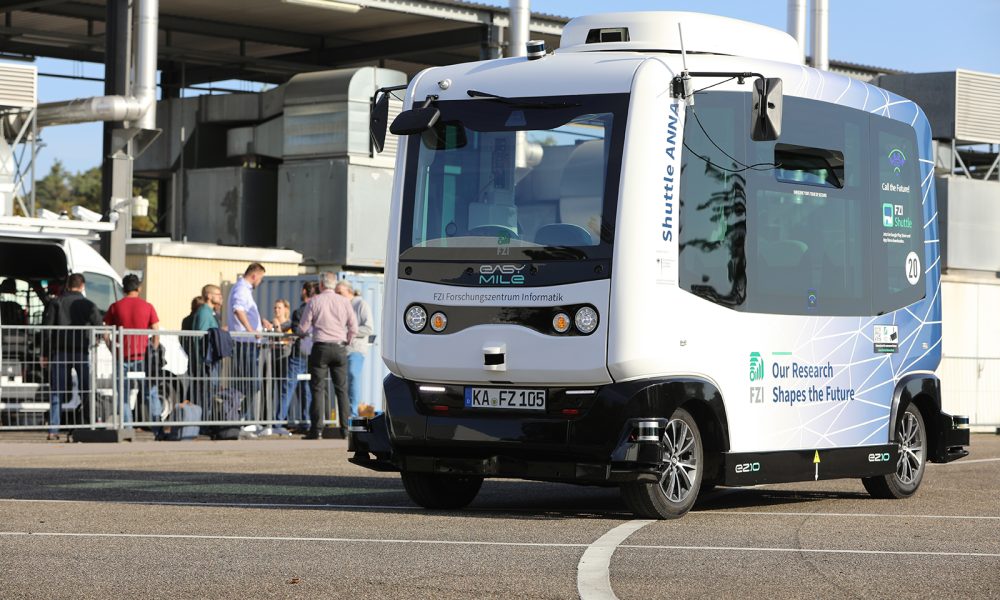regioKArgoTramTrain
Jointly moving people and goods
Intelligent systems for mobility and logistics arise from the interaction of research, technology, and application, ranging from automated vehicles and AI-supported traffic control to digital twins and integration platforms.
We explore AI-based ways to automate vehicles, from developing algorithms to testing them in real and digital test environments. This helps us create scalable solutions for tomorrow’s mobility that will benefit both industry and government.
We design software and hardware architectures for software-defined vehicles. Our solutions ensure that our industry partners benefit from powerful, flexible, and secure systems, from microelectronics to connected mobility systems.
From autonomous delivery robots to smart hospital logistics, we develop digital and sustainable logistics solutions. Our concrete applications benefit industry, retail, healthcare, and public institutions.
We don’t just develop technologies; we make an impact, too. This includes AI algorithms, autonomous delivery robots, and test vehicles on public roads. Using our digital twins, we can map traffic areas as 3D models containing simulated road users and infrastructure, enabling precise testing with virtual sensor data. In this way, our research contributes to the development of sustainable mobility concepts.
Jointly moving people and goods
Efficient and highly accurate data generation for AI applications in autonomous driving
Standardized interfaces for greater speed, safety, and sovereignty in vehicle development
New approaches for interconnected hospital logistics
The modular toolbox for flexible robotics, tailored to the needs of small and medium-sized automotive suppliers
Artificial Intelligence in Traffic Systems
Supercomputing Platform for Highly Automated Vehicles
Munich’s Automated Public Transport with Ridepooling, Solo Bus and Bus Platoons
Reference sensor platform for high-precision sensor validation for automated driving
Software development skills are the foundation of the software-defined vehicle
Together with partners from industry and government, we develop mobility and logistics solutions that transform research into practical innovations. The result is solutions that stand the test of time in everyday use, from the first prototype to testing in live traffic. Our solutions are scalable, connectable, and ready to use, bringing research to life. Cooperating with us means: no off-the-shelf concepts but ready-to-use, future-proof technologies that open up new avenues. Our interdisciplinary teams cover a wide range of fields, including software engineering, AI, sensor technology, and hardware development. We create spaces for innovation, testing, and knowledge transfer using test fields, digital twins, and open-source approaches. Our infrastructure is open to partners of all sizes, from start-ups and SMEs to large international corporations.
CoCar NextGen is a groundbreaking research platform for automated and connected driving. Its modular structure, developed in-house, and its access to the entire German road network are what make the platform stand out.

The highly automated and connected FZI shuttles are an ideal solution for the last mile. They can, for example, be integrated into public transport systems as an on-demand solution.
We have a strong strategic network – regional, national, and across Europe. Our research benefits from collaboration with leading partners. Together, we are driving forward topics such as automated and connected driving, software-defined mobility, and the application of the latest AI processes in mobility.

Areas of expertise: Model-driven design methodology for safety-critical embedded hardware and software systems / Verification and validation of technical systems / Optimization methods for software-intensive AI systems / Use of AI for mobility systems

Areas of expertise: Areas of expertise: Data-driven decision-making with a focus on intra- and transport logistics / Optimization and simulation of mobility and logistics systems / Development of algorithmic solutions for complex systems in a dynamic environment